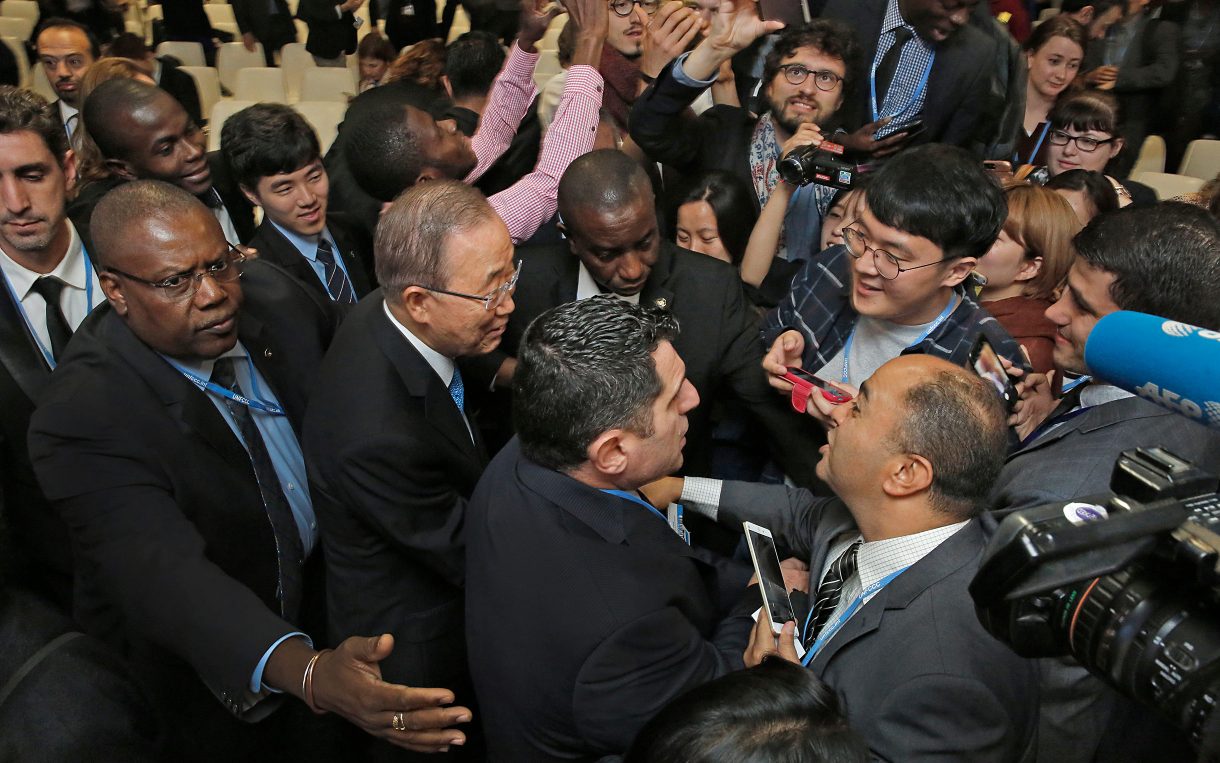Here’s Looking at You, COP
 UN Secretary General Ban meets with representatives of non-governmental organizations at the climate change negotiations in Morocco. UN Photo/Evan Schneider
UN Secretary General Ban meets with representatives of non-governmental organizations at the climate change negotiations in Morocco. UN Photo/Evan Schneider
For an American working on climate change, the last couple of weeks felt as surreal as a movie. But the climate crisis is no fiction.
Thomas Damassa is Oxfam’s senior policy advisor on climate change in Washington, DC.
Sitting in the Casablanca airport on my way back from the annual UN climate change negotiations, I couldn’t help but think about Casablanca, the classic 1942 film that’s one of my favorites. As an American working to address climate change, this year’s convening of the conference of the parties, or COP, even felt a bit like the film’s main setting, Rick’s Café—a safe haven away from a gathering storm.
That storm was the US election results and, in truth, there was no escaping them, not even in Morocco. With an incoming administration that will soon be the only one on earth to willfully ignore the existence of climate change, I had a lot of explaining to do to my international colleagues. Their anxiety—and mine—is that the world needs US leadership right now on climate change. More is required of America on this issue, not less.
US political leadership should be collaborating with other countries to implement policies that ensure a stable climate, as well as provide clean air and water, and inclusive, sustainable, economic growth. The world also needs the United States—the biggest culprit for climate change—to show moral and financial leadership in support of those already reeling from the devastating impacts of a changing climate. We should never forget that our tax dollars can be a lifeline to people around the world.
Indeed, in one of the final moments of the COP, the Prime Minister of Fiji—a country disappearing due to sea level rise—asked the US to reprise its role in WWII, and save the world. I desperately hope the US will answer this call.
We’ll always have Paris
Despite an uncertain future for US climate policy (and the deluge of media attention to this point), what was also made clear at this year’s COP is that countries are committed to moving forward together. The global compact to combat climate change—known as the Paris Agreement—which was signed last year by 196 countries and entered into force just days before the COP started proved it can be the bedrock of future climate action.
In fact, countries showed that no matter their situation, addressing climate change is a common imperative. For example, 47of the most vulnerable countries committed to using 100 percent renewable energy. The UK, which recently went through its own political upheaval, ratified the Paris Agreement during the COP, proving that leaders, regardless of ideology, can have the foresight to tackle a problem that will long outlive their political tenure. Even representatives from war-torn Yemen and hurricane-battered Haiti came to Morocco to make speeches professing a commitment to multilateralism and actions to address climate change.
Importantly, the initiatives announced at this year’s COP, while notable, also only represent a fraction of the actions being taken by cities, companies, and communities across the world. We now hopefully, and at long last, have the irreversible momentum toward a more climate-resilient future.
As time goes by
But we are also still in a race against time (if anyone needed a reminder of this, the negotiations were wrapping up as it was reported that the North Pole is currently an astounding 36oF warmer than normal), and progress being made through the global climate negotiations is still moving much too slowly. When more action is urgently needed, the status quo should not be the UN’s default setting. Outside of the negotiations, governments must also be bold in cutting ties with fossil fuel dependency and embracing the benefits of a clean-energy economy. Political statements are not equivalent to policy changes, and we need more of the latter. We also can’t allow, as US Secretary of State John Kerry put it, ‘suicidal’ decisions to be made that jeopardize the well-being of many for the benefit of a few.
It’s daunting, to say the least, but how can we not try? This is the world we are making for our children, our grandchildren, and billions yet born.
I think this is the beginning of a beautiful friendship
Still, coming back to America, and to Casablanca, I find myself asking the same question the film’s cynical protagonist, Rick, asks of Victor Laszlo—a WWII freedom fighter, risking his life for his allies:
“Don’t you sometimes wonder if it’s worth all this? I mean what you’re fighting for.”
Laszlo responds: “You might as well question why we breathe. If we stop breathing, we’ll die. If we stop fighting our enemies, the world will die.”
A bit dramatic—it’s Hollywood after all—but I think it’s pretty accurate for climate change. There is no greater challenge right now and with so much at stake, standing on the sidelines is not an option. If we know what’s right, we must continue to fight.
And much of the hope and faith I have left for that fight now rests in something else that was on display at COP: a united, committed group of civil society influencers and activists. Thousands of organizations representing millions of individuals ready to work harder to hold accountable those with power and speak for those who do not have a political voice or who are at risk of being left behind. I’m proud to count myself and Oxfam among them. Moving forward, we must find new ways to work together and to better convey the opportunities of a cleaner, more efficient and more inclusive world to everyone. For no matter what the future brings as our climate changes, we are most certainly in it together.